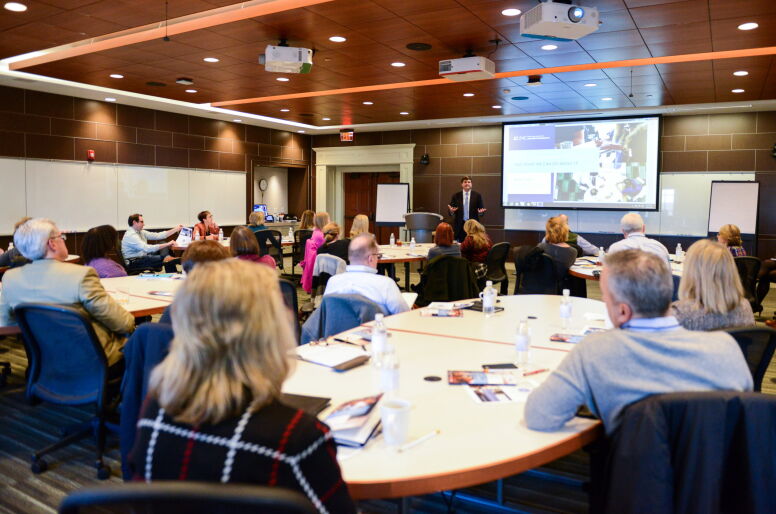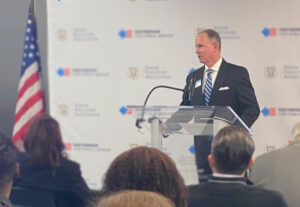News & Stories
Mission driven

Kirk Lawrence didn’t take long to see just how impactful UNC Executive Development’s work can be.
After running into a former classmate from the U.S. Military Academy at West Point, Lawrence shared that he had joined UNC Executive Development as a program director. His friend immediately asked if he was involved with a leadership program the UNC team designed for U.S. Army general officers.
“He told me, ‘I went to that program six years ago and I completely changed the way I made decisions based on it,’” Lawrence says. “That’s what you want to hear.”
He hears that a lot.

Kirk Lawrence leads UNC Executive Development’s Government and Defense Sector program.
Under Lawrence’s leadership and now as UNC Executive Development Government and Defense Sector senior director, UNC Kenan-Flagler Business School has expanded the number of custom-designed government programs from three in 2013 to 22 in 2023.
To support this growth, the team expanded to include two additional program directors, Patrick Martin, a retired U.S. Navy captain, and Amy Parker, former chief learning officer at the Veteran Affairs and retired member of Senior Executive Service.
Clients representing all branches of the military have taken UNC Executive Development programs focused on such topics as organizational leadership, addressing emerging challenges and strategic thinking. These programs are carefully crafted for different levels of responsibility, from general officers and senior civilians to mid- and senior-level staff.
The Government and Defense Sector focuses on four areas:
- Leader development: Based on practical research-based frameworks, the team provides personal and organizational leadership approaches immediately impactful at all levels — from mid-management to the most senior leadership positions.
- Business acumen: Aimed at the acquisition and contracting communities, the team helps leaders understand how defense companies behave, what motivates their behavior and how to devise strategies that drive positive outcomes for both taxpayers and the industrial base.
- Data analytics: Designed for senior executives and leaders, the team explains how to use data to drive organizational decision-making. The leaders are equipped with the knowledge to improve collaboration and ask better questions of relevant teams and data analysts.
- Supply chain complexity and disruption: Targeted at procurement and logistics leaders, classes explore supply chain management challenges facing government and industry. Leaders learn predictive measures and strategies to minimize or prevent supply chain challenges affecting all branches of government.
Clients invest in UNC Executive Development programs to address organizational challenges and lay the groundwork for successful futures. They leave with new, inspired mindsets. The programs also make a deep impact on government and defense budgets.
An official told UNC Executive Development leaders that the Navy has saved more than $6.8 billion across multiple projects over 11 years through strategies learned in Understanding Defense Industry, one of UNC Executive Development’s longest-running programs.
“We’re helping our clients learn new ways of looking at problems, situations and environments that are an essential part of becoming a more effective leader,” says Lawrence, who joined UNC Executive Development following a 30-year Army career and a few years in corporate roles. “It’s about increasing their capacity to step outside of their comfort zone and widen their scope.
“We want them to walk away from any session with a toolkit and framework that can immediately be put into play.”
Collaborative spirit
UNC Executive Development programs are never one-size-helps-all.
Before developing any program, program directors like Lawrence meet with the client to get a complete understanding of their unique needs and long-term goals. They create new programs with that information in mind, and existing programs are often tweaked to address evolving government priorities and leadership changes.
It’s the same approach all UNC Executive Development teams take when working with Fortune 500 company executives and other key leaders. They carefully customize programs for individual clients in numerous industries, an approach that has firmly established UNC Executive Development as a top-ranked, internationally acclaimed education partner for 70 years.
“The relationships with all of our clients are very much partnerships,” says Lawrence. “Our program directors all come from leadership and development backgrounds through the U.S. government or corporations. Each of us can look at a client and say, ‘I’ve been there. I understand your challenges because I have lived it all, too.’”
UNC Kenan-Flagler faculty who teach in the programs are flexible as well, adapting content for groups very different than the undergraduate and graduate students they teach.
“We’re helping our clients learn new ways of looking at problems, situations and environments that are an essential part of becoming a more effective leader. We want them to walk away from any session with a toolkit and framework that can immediately be put into play.”
A few years ago, the chief of staff of the Army asked the UNC Executive Development team to adjust its general officer program to include a large block of ethics instruction. Lawrence reached out to a faculty member whose research focuses on the determinants and consequences of power within companies.
“We talked about topics like what happens to someone psychologically as they rise up an organization’s ranks and how attaining more power and authority can change people in ways they may not recognize,” says Lawrence. “I thought it was potentially powerful and different.”
They pitched it to the Army who agreed to give the program a try. It was so successful that they began offering it to clients from all military branches. The vice chief of the staff of the Air Force reached out directly to learn more about it and was later sent a recording of the seminar.
“It takes a special ability to engage with leaders who are tackling real-world problems in their organizations,” says Lawrence. “UNC Executive Development faculty from UNC Kenan-Flagler are very carefully selected and are the critical piece to our success.”
His work is fulfilling in other ways. Before he enrolled at West Point, the North Carolina native’s first and only choice for college always had been UNC-Chapel Hill.
“I tell people it took me 38 years to get back here,” says Lawrence. “I love this university. I love what it stands for, and it is very meaningful for me to be a part of that at this stage in my life.”
The work is still personal. Lawrence’s wife and younger son are UNC graduates, and his older son is an Army intelligence officer serving in Europe.
“One day he might be standing on a hilltop somewhere, and you can well bet that I’m hoping that whoever’s making the decisions has had the benefit of experiencing what we do,” says Lawrence.